Acquiring a Kishu Ken: Insights and Considerations

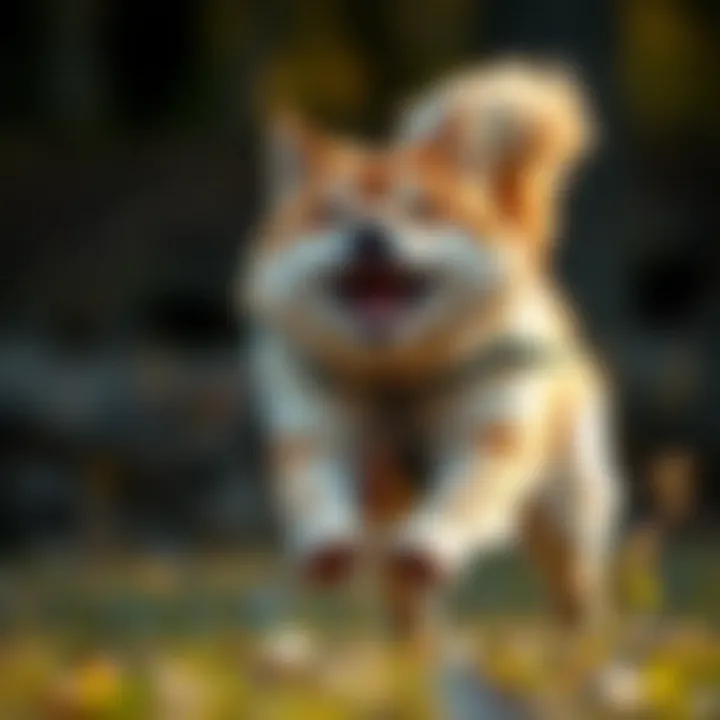
Intro
When it comes down to finding a loyal canine companion, the Kishu Ken stands out as a remarkable breed with deep roots in Japan. This breed isn't just about looks; it's a tapestry entwined with history, culture, and purpose. Known for its keen hunting prowess, the Kishu Ken is often regarded as a companion who bridges the gap between nature and home. In this piece, we will explore the essential factors one must consider when contemplating the acquisition of a Kishu Ken, from understanding its noble characteristics to ensuring an environment that nurtures its instinctual traits and needs.
Animal Species Profile
Prologue to the Animal Species
The Kishu Ken, a breed revered in its native Japan, originated in the Kishu region where it was primarily utilized for hunting large game. This breed encompasses a strong sense of loyalty and independence, making it a well-suited companion for those who appreciate an active lifestyle. Historically, the Kishu Ken has been a silent yet powerful partner to hunters, reflecting an intrinsic bond between dog and human that's shaped by shared experiences and mutual respect.
Physical Characteristics and Appearance
Kishu Kens are medium-sized dogs, often boasting a well-defined muscular structure. They have a broad head, standing ears, and a bushy tail that often curls over their back. The breed typically showcases a short, dense coat that can be solid or patterned, with colors ranging from white, red, brindle, to sesame. Their striking appearance is complemented by an expressive face that reflects both intelligence and an unmistakable stubborn streak. Each Kishu Ken carries an air of dignity, embodying the spirit of an ancient hunting dog while remaining adeptly attuned to modern companionship.
Natural Habitat and Distribution
Traditionally hailing from the mountainous regions of Japan, Kishu Kens thrive in environments that offer ample opportunity for exploration and activity. Dense forests and open fields are their ideal playgrounds, allowing them to indulge their hunting instincts. Unfortunately, their population has dwindled due to urbanization, with a greater concentration existing within Japan but slowly gaining recognition in other parts of the world.
Behavior and Social Interactions
Kishu Kens are known for being fiercely loyal yet somewhat aloof with strangers. Their independent nature means they might not always warm up immediately to newcomers, reflecting their historical role as hunters rather than playful companions. Happy and engaged, Kishu Kens do exceedingly well in households that can offer a structured environment rich with stimulation. Socialization from a young age is crucial as it helps foster a sense of security and comfort with various sounds, people, and other animals.
[A well-socialized Kishu Ken exhibits balanced behavior and adapts more effortlessly to new experiences.]
Pet Care & Tips
When deciding to bring a Kishu Ken into your home, there are various aspects to consider to ensure a harmonious existence. Here are a few pivotal factors:
- Choosing the Right Pet for Your Lifestyle: Ensure that your living situation mirrors the needs of a Kishu Ken. They thrive in active homes with a strong outdoor component.
- Basic Care Requirements and Habitat Setup: Establish a comfortable living space. They need room to roam, play, and exercise. A secure, fenced yard is ideal for their safety.
- Health and Wellness Tips for Pet Longevity: Regular vet check-ups, a balanced diet, and exercise are essential. Keep an eye out for common ailments that may affect them due to their strong build.
- Training Techniques and Behavioral Enrichment Ideas: Begin training early with positive reinforcement methods. Engage them intellectually through puzzle toys and obedience training; this not only sharpens their mind but also deepens your bond.
The Kishu Ken represents more than just a pet; it encapsulates a blend of ancient tradition and modern companionship. Understanding its characteristics, behavior, and needs empowers potential owners to make informed decisions. As we proceed through this guide, we aim to paint a holistic picture that fosters both appreciation and practical knowledge about this remarkable breed.
Understanding the Kishu Ken Breed
The Kishu Ken is not just another dog breed; it's a symbol of a rich cultural heritage and a testament to the unique relationship between humans and dogs in Japan. Understanding this breed is crucial for anyone considering bringing a Kishu Ken into their home. This knowledge equips prospective owners with the necessary insights into the dog's needs, temperament, and historical background, ultimately leading to a harmonious companionship.
Origins and History
Kishu Ken is steeped in history, tracing back over a thousand years in Japan. Initially bred for hunting game, particularly wild boar and deer, these dogs reflect the fierce spirit of their mountainous homeland, the Kishu region. The breed has been celebrated not just for its physical prowess but also for its strong instinct to track and retrieve.
The lineage of the Kishu Ken shows a unique blend of practicality and honor. It symbolizes the dedication of ancient Japanese people who relied on these dogs for sustenance and protection. Their importance was so profound that Kishu Ken was recognized as a national treasure in Japan, earning the designation of a natural monument in 1934. Today, as more people become aware of this breed outside Japan, they recognize the depth of tradition that these dogs uphold.
Physical Characteristics
Kishu Ken exemplifies an average size dog, usually weighing between 30 to 60 pounds. A typical example stands between 17.5 to 22 inches tall at the shoulder. The breed is known for its athletic build, featuring a broad head and well-defined cheek muscles; it's not just about looks, but this structure aids in their stamina and strength when hunting.
Their coat can be either short or medium, offering a variety of colors including white, red, brindle, and even some black varieties. It’s worth noting that Kishu Ken is adaptable to diverse climates but benefits from proper grooming practices. Their thick fur serves as a natural barrier against the elements, making them suited for outdoor activity.
Temperament and Behavior
When it comes to personality, the Kishu Ken is a complex character. They are loyal and protective, often forming strong bonds with their families. These dogs possess an independent spirit, a trait developed from centuries of hunting when they often had to rely on their instincts alone. Thus, they may not always seek approval or guidance like other breeds.
Training a Kishu Ken can be a double-edged sword; they can be headstrong. It requires patience, consistency, and a good understanding of canine behavior. However, this same independence makes them capable thinkers, often able to assess situations and react accordingly. Hence, their training must align with positive reinforcement methods, emphasizing reward over correction.
"A well-trained Kishu can be as loyal and intuitive as they are intelligent. Guarding is in their blood; a well-socialized Kishu Ken can be trusted with children and other pets."
Understanding the complexity of their behavior is essential. Early socialization is critical to ensure that the dog grows up to be well-mannered. Kishu Ken can exhibit strong prey drives, so careful management of their exposure to small animals is necessary. All in all, the Kishu Ken offers loyalty and companionship, albeit with a unique set of characteristics that every owner must understand completely.
The Appeal of Kishu Ken
The Kishu Ken isn’t just a breed aimed at show-offs or mere pet lovers; it possesses qualities that resonate deeply with those who appreciate the bond between humans and canines. Delving into its core attributes provides insight into why this breed stands out among others. Each feature of the Kishu Ken, from its loyalty to its athletic nature, crafts a narrative that speaks volumes about its suitability for the right owner. Below, we explore the myriad appeals of the Kishu Ken, particularly emphasizing its loyal companionship, agility, and guarding instincts.
Loyal Companionship
One of the primary draws of owning a Kishu Ken is its unparalleled loyalty. This breed has been so closely associated with humans throughout history that forming strong bonds becomes second nature. When a Kishu Ken considers you as part of its pack, the connection is not only strong but also enriching.
For instance, imagine coming home after a long day at work; a Kishu Ken doesn’t just greet you; it welcomes you with undivided enthusiasm—a tail wagging like it’s a drumroll signaling your grand entrance. They thrive on familial relationships and make it a point to be involved in the day-to-day happenings of the household. However, their loyalty isn’t blind; it’s built on mutual respect and trust. As a responsible owner, understanding this dynamic is crucial. The Kishu Ken’s loyalty often translates into a desire for companionship, which means leaving them alone for extended periods might not be the best approach.
Agility and Athleticism
A Kishu Ken is not built for lazy days on the couch. When you think about this breed, the words "agility" and "athleticism" come to mind immediately. Bred for hunting in the mountainous regions of Japan, these dogs possess a level of physical capability that can keep pace with an active lifestyle. Whether it’s hiking rugged trails, participating in canine sports, or engaging in playful runs at the park, a Kishu Ken shines in environments where it can showcase its agility.
In fact, many owners find that regular exercises not only keep their Kishu Ken fit but also cultivate a deeper bond through shared activities.
"A tired Kishu Ken is a happy Kishu Ken."
This breed thrives on challenge and stimulation, requiring consistent and varied forms of exercise to keep its mind sharp and body fit. Hence, understanding the breed’s athletic nature is imperative for prospective owners looking to fully integrate a Kishu Ken into their lives.
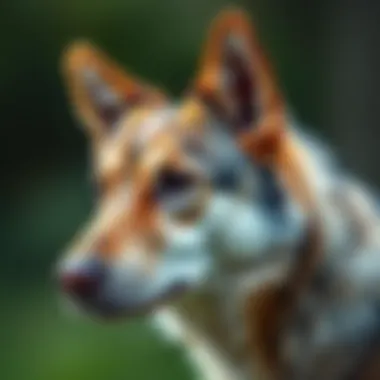
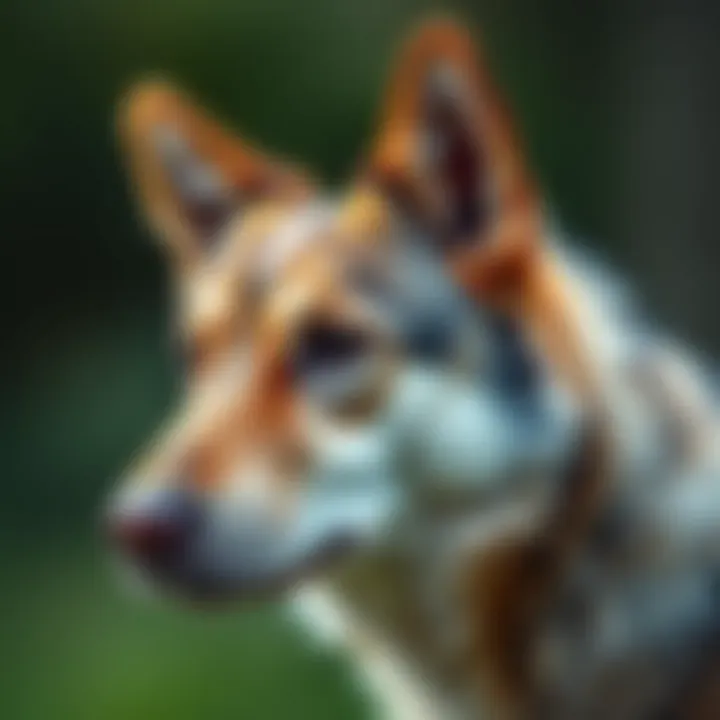
Guardianship Instincts
Kishu Kens are not just affectionate companions; they inherently possess a guarding nature that makes them formidable protectors of their families and surroundings. This breed's instinct to protect is deeply rooted in its history as a hunting dog. The Kishu Ken's keen sense of awareness allows it to monitor its environment and react appropriately to perceived threats, making it an excellent choice for individuals or families seeking both a pet and a protector.
However, it’s essential to channel this instinct wisely. Early socialization and proper training are vital in ensuring that the dog’s guarding tendencies don’t manifest as overly aggressive behavior. Teaching it to differentiate between normal activities and potential threats helps in cultivating a balanced guardian.
In summary, the Kishu Ken appeals to potential owners not just for its loyalty, agility, and natural guardianship, but for the enriched life experience that comes with owning such a dynamic breed. Taking the time to understand these facets will not only aid in the decision-making process but will ultimately lead to a more fulfilling canine companionship.
Key Considerations Before Purchase
Acquiring a Kishu Ken is no small feat. It involves not just a sentimental decision but also still practical considerations that could affect both the dog and the owner. This section will shed light on several elements underlining the importance of evaluating the key considerations before deciding to bring this unique breed into your life. Understanding the Kishu Ken’s needs and aligning them with your lifestyle is crucial to ensuring a mutually rewarding companionship.
Space and Environment Requirements
Kishu Kens are not just lap dogs. They are medium-sized canines that require ample space to roam and play. Ideally, a home with a large yard is beneficial, since they have a natural inclination toward exploring their environment. If your living situation is a small apartment or a house in a busy neighborhood, think twice. These dogs thrive in settings where they can partake in outdoor activities, like hiking or tracking their own territory. Here are a few points to consider:
- Fencing: A secure, high fence is essential, as Kishu Kens are known to be agile and can easily leap over lower barriers.
- Shelter: A warm, comfortable place to rest is a must for them, especially during colder months since they have a short coat.
- Accessibility to Nature: Proximity to parks or open spaces can prove advantageous, allowing your dog the freedom to engage in exercise and socialization.
Time Commitment and Training Needs
Bringing a Kishu Ken into your home is akin to adding another member to the family and requires a serious time commitment. These dogs thrive under the guidance of a strong handler, as they are intelligent yet independent. Training should begin early, focusing on obedience and socialization. This blend of training can help mitigate behavioral issues later on. It's not just about basic commands; Kishu Kens need mental stimulation and variety to keep them engaged. Consider the following:
- Daily Exercise: A minimum of 60 minutes of physical activity is recommended each day. This can range from walks to engaging fetch games or agility training.
- Training Sessions: Short, consistent training interactions work wonders. Aim for sessions of 10 to 15 minutes to keep your dog attentive.
- Professional Help: If training seems daunting, seeking a professional who understands the breed may ease the pressure.
Health Considerations
The health of a Kishu Ken is paramount. While they are generally a robust breed, like any other, they are predisposed to certain health concerns. Potential owners should be ready to manage not only routine veterinary visits but also be vigilant about specific conditions. Here’s what you should keep in mind:
- Regular Vet Visits: Routine check-ups and vaccinations go a long way in ensuring that you catch health issues early.
- Diet and Nutrition: Investing in high-quality dog food should not be overlooked. A well-balanced diet can prevent obesity and related conditions.
- Health Screenings: Some health issues, such as hip dysplasia or autoimmune disorders, can be hereditary. Ensuring that your breeder tests for these conditions should be a priority.
In essence, prospective owners must ask themselves if they can meet the Kishu Ken's unique needs before welcoming them home. Ignoring these considerations can lead not only to frustration but also to a lack of fulfillment for both pet and owner.
By taking these key factors into account, individuals can better prepare themselves for the joys and responsibilities that come with a Kishu Ken. A well-thought-out decision leads to harmony in the owner-Kishu Ken relationship, which is well worth the effort.
Exploring Purchase Options
When it comes to welcoming a Kishu Ken into your life, the choice of where to acquire one is pivotal. This seemingly simple decision carries constraints and benefits that can affect not only the experience of becoming a pet owner but also the well-being of the dog itself. By exploring various purchase options, prospective owners can weigh their alternatives and make informed decisions that serve both their interests and the needs of the Kishu Ken.
Reputable Breeders
Purchasing from a reputable breeder is one of the most suitable avenues when seeking a Kishu Ken. A trustworthy breeder often comes with a wealth of experience and knowledge about the breed, ensuring that the dogs are raised in a nurturing environment. This not only contributes to the physical health and temperament of the dog but also offers owners a well-documented history of their future pet.
It is crucial to establish a relationship with the breeder. Ask them detailed questions about their breeding practices, the lineage of the dogs, and any health screenings that have been performed. A responsible breeder should be forthcoming with information and often welcomes inquiries. Here are some key considerations:
- Health Testing: Confirm whether the breeder conducts health checks for genetic disorders that may affect the Kishu Ken.
- Environment: Visit the breeding facility to observe the state of living conditions. A clean and peaceful environment reflects a breeder dedicated to the dogs' welfare.
- Socialization: Observe how the puppies interact with both humans and other dogs, as early socialization is essential for a well-adjusted pet.
Rescue Organizations
Opting for rescue organizations presents another compassionate way to bring a Kishu Ken into your home. Many wonderful dogs are in need of a second chance, and adopting from a rescue not only provides a loving home but also supports the ongoing efforts of these organizations.
Engaging with these organizations can unfold a rewarding journey. Prospective owners often have the option to meet the dogs and gain insights from their foster caregivers. The following points outline the benefits:
- Knowledge of Dog's Behavior: Foster caregivers usually have valuable insights into the dog's temperament, quirks, and habits, which can ease the transition into a new home.
- Lower Costs: Dogs from rescue organizations are often more affordable compared to purchasing from breeders, as fees typically cover vaccinations, spaying or neutering, and sometimes even health checks.
- Community Support: Many rescues provide post-adoption support and resources, aiding owners in the adjustment period.
Online Marketplaces
In today’s digital age, online marketplaces have emerged as a popular route for acquiring pets, including Kishu Kens. While they present convenience and a broad selection, it's important to tread carefully. Although legitimate, many listings may involve breeders with varying degrees of reputability, and caution is necessary to avoid pitfalls that online platforms can pose.
When considering this option, a few pointers can help ensure a successful experience:
- Research Thoroughly: Always check the background of the seller and seek out reviews from past buyers.
- Avoid Impulse Buys: It is easy to get swept away by cute photos; however, one must ensure that every detail aligns with ethical practices.
- Meet before Committing: If possible, visit the seller to meet the puppy and see the environment where the dog was raised. This can help ascertain the conditions in which the dog was bred and cared for.
Evaluating Breeders and Sellers
When it comes to bringing a Kishu Ken into your life, evaluating breeders and sellers is crucial. This step can make the difference between a healthy, well-adjusted dog and one that may face significant health or behavioral obstacles down the line. You must choose wisely, for the long-term health of your future companion depends on the foundation they are bred from. The credibility and practices of breeders dictate much about the dog's temperament, health, and adaptability to your home environment.
Questions to Ask
Before you even step foot on a breeder’s property or click on a seller's website, it’s essential to equip yourself with the right questions. Here are some to keep in mind:
- What is your breeding philosophy? Understanding why a breeder chooses to breed Kishu Ken can offer insights into their care and commitment to the breed's preservation.
- Can I see the puppy’s parents? Witnessing the behavior and health of the parents can give you a good barometer of what to expect from the puppy.
- What health screenings have been done? Responsible breeders should readily provide documentation for screenings like hip dysplasia and eye conditions, ensuring that the dog is at lower risk for inheritable problems.
- Can you provide references? Past customers can share their experiences, helping you gauge the breeder’s reputation.
- What is the socialization process for the puppies? Early interaction with various environments, people, and noises is vital for a solid temperament.
Signs of a Responsible Breeder
Finding a reputable breeder is no walk in the park. However, there are some telltale signs that can point you in the right direction:
- Transparency: They should willingly share information about their breeding practices, health tests, and the lineage of their dogs.
- Healthy Environment: Puppies should be raised in clean and stimulating surroundings, where they are socialized and receive proper care.
- Support Post-Purchase: A good breeder remains available for questions and support after you take your puppy home. They should be interested in the success of the placement.
- Consultation on Placement: Responsible breeders should ask about your lifestyle and experience and determine if a Kishu Ken is a suitable fit for you.
Red Flags to Avoid

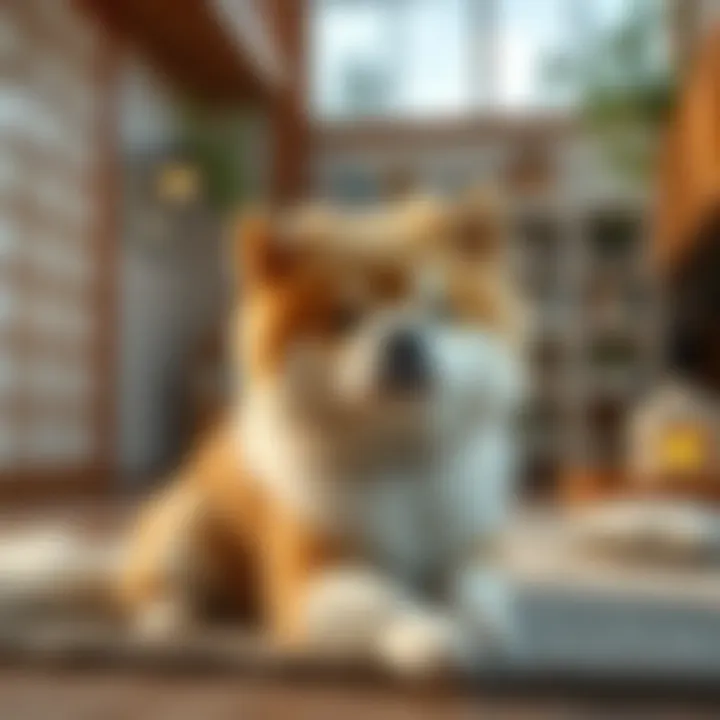
Just as there are signs that indicate a good breeder, you should keep an eye out for warning signs that could spell disaster:
- Lack of Health Documentation: If there’s hesitation around providing health records for the parents, it may suggest a breeding operation that doesn’t prioritize dog well-being.
- Too Many Breeds Available: A breeder focusing on one or more breeds may lack specialization and can indicate a puppy mill mentality.
- No Interest in the Buyer: If a seller seems indifferent about your experience or doesn’t ask any questions themselves, they may not have ethical breeding practices in mind.
- Pressure to Buy: If you feel pushed to purchase a puppy without adequate time to think it over, this can be a clear indication that the seller prioritizes sales over healthy and responsible placements.
Remember, it’s not just about finding the right Kishu Ken; it’s also about ensuring that they come from a place that honors their health and happiness.
Evaluating breeders and sellers is a key piece of the puzzle when looking to add a Kishu Ken to your family. Take your time, ask the important questions, and don't overlook your instincts. It’s a commitment—not just to the dog, but to the ethical considerations of pet ownership that reflect on us all.
Cost of Owning a Kishu Ken
Understanding the cost of owning a Kishu Ken is paramount for anyone considering bringing one of these loyal companions into their life. Beyond the initial excitement of adopting or buying a pet lies a spectrum of financial responsibilities that require careful thought. Owning a Kishu Ken isn’t just about the love and companionship they offer; it also involves a financial commitment that can shape the quality of life for both the dog and the owner. Assessing the costs accurately will ensure that prospective owners are prepared for all that comes with Kishu Ken ownership.
Initial Purchase Price
The initial purchase price of a Kishu Ken can vary widely, typically ranging from $1,500 to $3,000 depending on the breeder’s reputation, location, and whether the dog comes from show stock. It's crucial to prioritize ethical breeding practices over cost alone. Cheaper options might be tempting, but often lead to unexpected challenges later on. When considering the purchase price, don’t forget to factor in travel costs if the breeder isn’t nearby. Additionally, if the dog comes with a pedigree, it may include extra costs associated with registration and lineage documentation.
Ongoing Expenses
Ongoing expenses are where many new pet owners can find themselves surprised. The commitment doesn't end with the initial purchase; Kishu Kens require a steady supply of food, grooming, toys, and general maintenance.
- Food: A quality diet is essential, and a Kishu Ken may consume around $60 to $100 per month, depending on their size and nutritional needs.
- Grooming: While this breed isn’t overly demanding in grooming, some costs might arise for occasional sessions at a groomer or DIY products like brushes and shampoos. Expect to spend $30 to $100 quarterly.
- Supplies: Initial expenditures on leashes, collars, bedding, and crates could set you back another few hundred dollars, with potential ongoing costs for new toys or replacement goods.
Remember, unexpected expenses can crop up, too, so it's wise to keep a little extra cash on hand for those rainy days.
Veterinary Care and Insurance
Veterinary care is one of the most significant aspects of owning a Kishu Ken. Routine check-ups and vaccinations, yearly, typically run between $300 to $600, depending on the vet and local prices. These visits can prevent costly health issues down the road, so they shouldn’t be overlooked.
Also, consider pet insurance. While it may seem like a luxury, it can save a bundle in emergencies or if your dog develops health issues. Monthly premiums range from $30 to $75, depending on coverage.
"Investing in a Kishu Ken means planning for their health as much as their happiness."
This coverage can help with serious conditions like hip dysplasia or other genetic disorders often found in dogs. Ultimately, while the costs associated can seem daunting, thorough consideration and planning can assure both you and your Kishu Ken lead a happy and healthy life together.
Overall, recognizing the cost of ownership ahead of time ensures you're set up for success. Owning a Kishu Ken is rewarding, but one must remember that with great responsibility comes practical considerations that shouldn't be ignored.
Integrating a Kishu Ken into Your Home
Bringing a Kishu Ken into your household isn't just about adding a furry friend to your family; it's a transformative experience that requires thoughtfulness and preparation. The Kishu Ken, known for its keen hunting instinct and loyalty, deserves a space where it can thrive and feel secure. Integrating such a unique breed into your home means understanding its needs and adapting your environment accordingly. This section will dive into what you need to prepare for, how to introduce your new pet to everyone in the household, and the importance of establishing routines for a harmonious cohabitation.
Preparing Your Home
Before welcoming a Kishu Ken, make sure your space is ready to accommodate its lively spirit. Given their energetic makeup, it's essential to ensure there’s enough room to roam and play. Start by assessing your living space—whether it’s a quaint apartment or a spacious house with a yard. Here are some considerations to keep in mind:
- Safety First: Secure areas that could pose risks, such as stairs or open windows. Ensure that any hazardous materials are out of reach.
- Create a Dedicated Space: Set up a cozy area where your Kishu Ken can retreat. A comfortable bed, toys, and access to fresh water will help it feel at home.
- Dog-Proofing Areas: Double-check that items like electrical cords, small objects, and valuable decorations aren’t within paw’s reach. This proactive step can prevent accidents and mishaps.
- Outdoor Access: If possible, have a secure outdoor space for exercise. Kishu Kens love to run, so consider options for safe fencing.
Introducing to Family and Other Pets
When you bring a new dog into your home, it’s important to consider how it will fit with existing family members and pets. The introduction phase is crucial for establishing a peaceful environment. Here are steps to smooth the transition:
- Quiet Introductions: Start by allowing the Kishu Ken to explore your home in a calm manner. Keep family gatherings small at first, minimizing overwhelming interactions.
- Supervised Meetings: If you have other pets, introduce them slowly in a neutral space. Supervise their interactions at first to gauge comfort levels and prevent potential conflicts.
- Positive Reinforcement: Use treats or praise to create a positive association. When they interact well, reward them—this helps build trust.
"Introducing a Kishu Ken to your family is like weaving a new thread into an existing tapestry; it adds richness but takes care and attention to do so harmoniously."
Establishing Routines
Dogs thrive on routines, and Kishu Kens are no exception. Establishing regular schedules for feeding, walks, and playtime helps your dog feel secure and know what to expect each day. Here are aspects to consider:
- Consistent Feeding Schedule: Provide meals at the same time daily. This helps the Kishu Ken adapt quickly and gives you the chance to monitor its eating habits.
- Daily Exercise: Schedule time for walks and play. Kishu Kens are active dogs; daily physical activity is vital for their health and happiness.
- Training Times: Integrate training sessions into your routine. Not only does this enhance obedience, but it also mentally stimulates your dog, which is necessary for this intelligent breed.
- End-of-Day Wind Down: Establishing a routine that includes quiet time at the end of the day can help your dog transition to rest. A relaxing cuddle or grooming session can signal bedtime.
Fostering a seamless integration of a Kishu Ken into your home will not only enhance your living space but also strengthen the bond between you and your new companion. The effort you put into making your home dog-friendly and establishing good habits will set the stage for a fulfilling relationship.
Training and Socialization
Training and socialization are crucial for the success of any dog ownership experience, particularly when it comes to a breed like the Kishu Ken. Known for their independent nature, Kishu Kens possess strong instincts and a keen sense of awareness. It’s not just about getting them to perform tricks; it’s about fostering a connection that allows for a well-adjusted pet. Investing time in training can lead to a harmonious household, where both the dog and owner can thrive.
Effective Training Techniques
When training a Kishu Ken, it’s important to understand that they often thrive in settings where they feel respected and valued. Positive reinforcement is a powerful tool. Instead of just corrective measures, using rewards such as treats or praises when they perform desired behaviors works wonders. Here are a few techniques:
- Consistency is Key: Dogs learn better when commands and rules are consistent. Ensure every member of the household is on the same page.
- Short Sessions: Given their independent nature, long training sessions can lead to boredom. Aim for 5-10 minute intervals throughout the day.
- Interactive Techniques: Incorporating games into training can not only reinforce the commands but also stimulate their minds.
Importance of Socialization
Socialization is more than just letting your dog meet other canines; it’s about exposing them to a variety of people, environments, and situations. For Kishu Kens, this can influence their behavioral pattern immensely. Here’s why it’s vital:
- Developing Confidence: A well-socialized dog is typically more confident in new situations, leading to less anxiety or fearfulness in various settings.
- Reducing Aggression: Exposure to a range of stimuli can help prevent perceived threats from escalating into aggressive behavior. Understanding different dogs and people can reduce their instinctive reactions.
- Belonging: Socialized Kishu Kens often integrate better into family structures and communities. They can actively participate in family events without fear or stress.

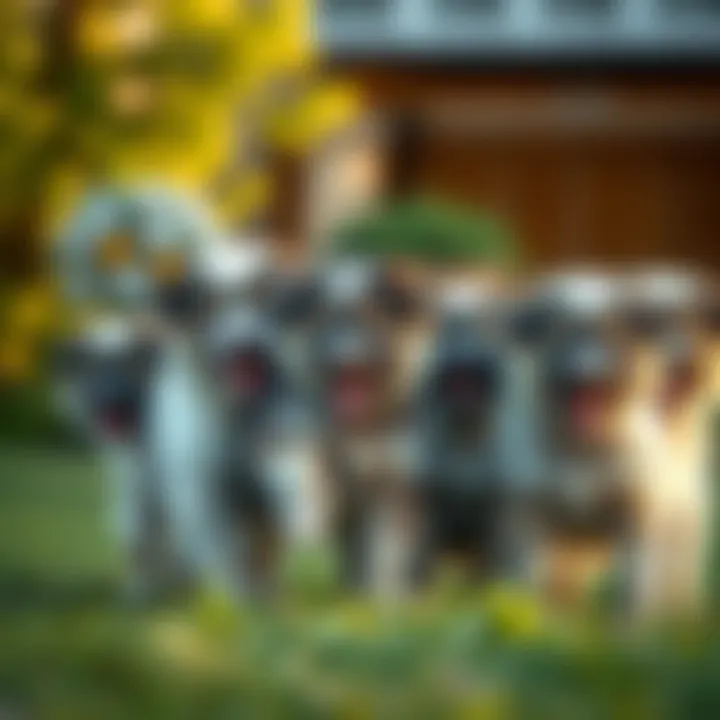
Discipline and Correction
Discipline doesn’t mean punishment; it’s about guiding your Kishu Ken to understand the difference between acceptable and unacceptable behavior. Here are some strategies to keep in mind when correcting behaviors:
- Immediate Feedback: When a Kishu Ken engages in undesirable behavior, correct them immediately. Dogs don’t associate actions with consequences if there’s a delay.
- Redirecting Behavior: Instead of scolding for inappropriate actions, redirect them to a more appropriate behavior. For instance, if they chew furniture, provide a designated chew toy when you catch them in the act.
- Patience and Understanding: Remember that these dogs may learn at their own pace. It might take time, and expecting immediate results can sometimes backfire.
"Training a Kishu Ken requires a mixture of art and science, balancing respect for their independence with clear boundaries and guidelines."
Understanding Breed-Specific Challenges
When contemplating the addition of a Kishu Ken to your life, it is imperative to recognize the unique challenges associated with this remarkable breed. Understanding these breed-specific challenges is an essential component in ensuring a harmonious relationship between the owner and their canine companion. Kishu Kens are known for their strong instincts as hunting dogs, which may manifest in certain behaviors and health considerations that potential owners need to be aware of.
A nuanced grasp of these factors can greatly enhance the success of cohabitating with a Kishu Ken, and can ultimately protect the wellbeing of both the owner and the dog.
Common Behavioral Issues
Kishu Kens, with their independent spirits, may display a range of behavioral traits that can challenge unprepared owners. One notable aspect of their personality is a tendency towards stubbornness. This dog breed often exhibits a mind of its own, which can complicate training sessions if not approached correctly. Here are a few common behavioral issues:
- Stubbornness: This can make them resistant to commands and require a patient approach.
- Barking: They might bark excessively if bored, which can become annoying if not addressed.
- Prey Drive: Originally bred for hunting, they might have a strong instinct to chase smaller animals. This could pose problems if you have cats or small pets in the household.
Therefore, it is crucial to implement consistent training techniques that are both engaging and respectful of their intelligence. Positive reinforcement methods work best, rewarding desired behaviors rather than punishing unwanted actions. This hands-on approach can help foster obedience while nurturing the bond between you and your Kishu Ken.
Health Risks in Kishu Ken
Like any breed, Kishu Kens come with their own set of health considerations that owners should keep in mind. Some health risks include:
- Hip Dysplasia: A genetic condition that can lead to arthritis if not managed properly.
- Skin Issues: Certain types of allergies or skin infections may appear, necessitating regular veterinary check-ups.
- Orthopedic Problems: Their agile nature may cause strain on their joints, particularly if they engage in high-impact activities.
To mitigate these health risks, regular veterinary visits are essential. Vaccinations, parasite control, and a balanced diet contribute to the long-term health of your Kishu Ken. An informed owner who is proactive about their pet's health can significantly enhance the dog's quality of life.
Physical Activity Requirements
Kishu Kens are energetic dogs that need regular exercise to keep both their bodies and minds stimulated. A lack of physical activity can lead to behavioral problems such as excess barking or destructive tendencies. Ideally, they should engage in:
- Daily Walks: Long walks or jogs are essential for burning off excess energy.
- Playtime: Structured play sessions that give them an outlet for their hunting instincts, like fetch or agility training.
- Mental Stimulation: Activities that challenge them mentally, such as puzzle toys or training games, can help curb unwanted behaviors due to boredom.
> For the sake of your Kishu Ken's happiness, consider incorporating both physical and mental exercises into your daily routine.
In summary, understanding breed-specific challenges related to behavioral tendencies, health risks, and activity needs is vital for prospective Kishu Ken owners. This breed is a wonderful companion but does require an owner who is committed to overcoming these challenges with patience, knowledge, and adaptability. By being prepared and informed, you can embrace the joys of Kishu Ken ownership while ensuring a fulfilling environment for both of you.
The Commitment of Ownership
Owning a Kishu Ken is more than just a choice; it's a long-term commitment that encompasses various aspects. This breed, with its unique traits and needs, requires dedicated effort from its owner. Thus, understanding the import of this commitment is vital to avoid potential pitfalls.
Long-Term Responsibility
When considering a Kishu Ken, it's essential to recognize that this decision spans many years, often well over a decade. Much like a fine wine that improves with age, a Kishu Ken's personality and capabilities develop over time. Owners must be prepared for this long-term responsibility, which includes consistent training, socialization, and health monitoring.
Maintaining a structured regimen is crucial to nurturing a happy dog. Kishu Kens thrive in environments where they can predict daily activities. Skipping routines may lead to behavioral problems. As such, committing to walks, playtime, and training sessions becomes integral to the owner's responsibilities.
Beyond daily care, there may arise unforeseen circumstances that impact the dog's health or well-being. Whether it’s an unexpected medical condition or changes in the family dynamic, being prepared to adapt is part of being a responsible pet parent.
Emotional Connection
Kishu Kens are not just pets; they become family members. The emotional bond developed over time is one of the true joys of dog ownership. This breed is known for its loyalty and affection, which creates a bond that goes deeper than simple companionship.
Feeling this connection becomes essential when life throws challenges your way. For instance, when you're having a bad day, a warm nuzzle from your Kishu Ken can instantly uplift your spirits. Likewise, they also sense your mood and react accordingly, offering support in ways that are nothing short of remarkable.
However, this emotional investment requires reciprocal commitment. Spending time with your canine companion strengthens this bond. Activities like playing fetch, going for hikes, or just lounging at home together can enrich both your lives.
Support Systems for Owners
Strengthening your position as a Kishu Ken owner can sometimes be daunting. This is where support systems come into play. Building a network of fellow dog owners, trainers, and veterinarians can provide you with invaluable resources.
- Joining Local Dog Clubs: These communities are excellent for exchanging advice and experiences. They provide insights into training dogs effectively and managing specific breed issues.
- Online Resources: Websites like Reddit’s r/KishuKen and specialized forums can connect you with experienced owners who offer practical guidance based on real-life experiences.
- Veterinary Support: Always maintain a good relationship with a local veterinarian familiar with Kishu Ken health concerns. Regular check-ups will help in early detection of potential health issues, which is always better than treating them once they bloom.
Finale: Making an Informed Decision
Navigating the world of pet ownership, particularly with a unique breed like the Kishu Ken, is no small feat. Making an informed decision is critical. Not just for your own satisfaction but for the well-being of the dog. This breed has specific needs that align with certain lifestyles and environments. Understanding these nuances ensures a better fit between the owner and the pet, fostering a harmonious and fulfilling relationship.
When approaching the decision to acquire a Kishu Ken, a few key aspects should be paramount in your mind:
- Lifestyle Compatibility: The Kishu Ken thrives in active homes where they can express their hunting instincts through play and exercise. They are not suited to a sedentary lifestyle.
- Commitment Level: These dogs demand time and patience for training and socialization, so knowing exactly how much time you can commit is essential.
- Health Awareness: Awareness of potential breed-specific health concerns can prepare you for future responsibilities, which helps in making educated choices.
In essence, the journey to welcoming a Kishu Ken into your life begins with research and reflection. It is about finding out if you and this spirited breed can dance to the same tune.
Recap of Key Points
- Origin and Traits: The Kishu Ken is a historically significant breed with roots in Japan and a sturdy build that combines beauty with functionality.
- Behavior: Known for their loyalty and cleverness, they still require a firm hand in training due to their independent nature.
- Considerations Before Purchase: Factors such as environment, time commitment, and health should weigh heavily in your decision-making process.
- Integrating into the Home: The right preparation, from setting up your living space to introducing this dog to other family members, is vital for a smooth transition.
If you adopt or purchase a Kishu Ken, you are not just adding a pet to your life, you are adding a partner, a fellow adventurer who will challenge and enrich your days.
Final Thoughts on Ownership
Owning a Kishu Ken is both rewarding and demanding. The bond you form with your dog can be profoundly fulfilling. However, it’s important to remember that this breed needs a committed owner who understands its complexities. Embrace the journey ahead; it's filled with the promise of companionship, loyalty, and shared experiences.







